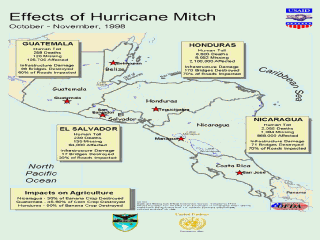 Click here to view the magnified slide.
Click here to view the magnified slide.
|
Hurricane Mitch resulted in billions of dollars in damages and thousands of
lives lost. Flooding and landslides, amplified by poor environmental and land
use management, were a main cause of devastation. Hurricane Mitch made clear the
interrelationship between management of watersheds' upper reaches and impacts
downstream. The impacts of inappropriate land management, poor agricultural
practices, overgrazing, deforestation, poorly sited housing developments, and
inadequate pollution control in the upper watershed are manifested in the lower
basin by extremes in availability and quality of water supplies, greater
vulnerability of populations and economic assets to natural disasters, reduced
power-generating capacity due to increased-sediment water courses, and damaged
coastal ecosystems. Hurricane Mitch also demonstrated the nexus between poverty,
environmental degradation, and vulnerability to natural disasters, resulting in
yet greater poverty.
In The Caribbean, it is estimated that Hurricane Georges caused 400
casualties and over $180 million total damage including indirect and secondary
losses in Haiti. The perverse synergy of overwhelming poverty, degraded
environment, and lack of infrastructure makes Haiti a "disaster-prone"
country. Nearly every year large segments of the population suffer from either
prolonged drought, frequent floods, or mud slides. An effective reconstruction
strategy should deal specifically with increasing local capacity within Haiti to
deal with recurring disasters.
|
